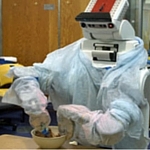
The trick to getting robots out of the labs and into commercial and consumer is software, not hardware, say experts.
Willow Garage sets its open-source software free to attract software developers and help make robots commonplace, but detractors say giving the software away is bad for business.
By Martin LaMonica for CNET, originally posted May 10, 2012
It would appear the robotics industry is having its Linux moment, which backers hope will unleash a torrent of creativity around robots. But not everyone's convinced that's a good thing.
Robotics company Willow Garage yesterday [May 9, 2012] created an open-source body to shepherd the development of its ROS (Robot Operating System). Called the Open Source Robotics Foundation, the goal is get more people writing software for robots, particularly for commercial and consumer use, say its creators.
Everyone agrees robots need killer apps to graduate beyond curiosities and cool demos, much the way the spreadsheet helped catalyze the PC movement. And developers need pre-built software platforms on which to create interesting uses for robots, whether it's a home robot to fold your laundry or a moon explorer.
But there's a debate as to whether the industry can actually make money—and thus grow—by giving software away for free. How this plays out in the years ahead could determine whether robotics becomes a thriving industry of many companies or remains firmly rooted in research.
For Willow Garage's Brian Gerkey, who will be CEO of the foundation, copying the path of Linux would be best-case outcome. Creating a non-profit with the mission of distributing and maintaining open-source software will attract for-profit businesses to the software, he predicted.
"The next stage for ROS and other open-source robotics software is to move it from use in education and research labs into actual product development," he said. "Having a non-profit will make more companies feel at ease."
DARPA is expected to use ROS in its ambitious Robotics Challenge and secretive robotics manufacturing company Heartland Robotics, founded by pioneer Rodney Brooks, is a founding sponsor of the first ROS development conference next week.
What would Steve Jobs do?
So it would seem that the disruptive force of open source is poised to take hold in robots, much the way it shook up everything from cell phones to enterprise software.
Not so fast, says iRobot CEO Colin Angle.
iRobot, which has become one of the most successful robotics companies with its home-cleaning and military robots, remains firmly committed to its proprietary, closed-source operating system. iRobot also wants to encourage non-robotics experts to write robot applications, but it's got a very different approach than open sourcing its crowned software jewels. Instead, its pedestal-shape mobileAva robot has a tablet for a user interface, which means any Android or iOS developer can write apps for Ava. Inside Ava, though, is mission-critical that should be protected.
More broadly, Angle argues that proprietary software is better for the American robotics industry. More intellectual property can be created with software, which will allow robotics companies to invest more in research and spur yet more interesting robots.
"If you give away the software, then you're creating a business around the hardware and hardware is mostly gears and motors and the competitive advantage in hardware goes to the lowest-cost manufacturer," he said. "So if your goal is to create an American robot company, then like the computer industry, the best way to do it is through software."
Open-source is OK for research but Apple has done very well with an integrated hardware-software model, he notes. "Linux did much less well than Apple did," he said.
Where's the IBM of robots?
With ROS, developers have access to low-level functions, such as class libraries for passing messages between sensors and the main processor, and even higher-level functions, such as tools for navigation. This type of software belongs in a common toolbox for developers because the biggest barrier robotics is good ideas, not nuts and bolts software, said Willow Garage's Gerkey.
"Much like what happened to Linux, the open system is going to win because more people are working on it, more people are looking at the code, and it has broader use," he said.
What's missing, though, is support from large commercial companies. Linux was first a hit with developers, but it wasn't until the big guns of the tech industry—IBM, Oracle, Intel, HP—committed to it seriously did it become a mainstay in corporate computing and product development.
Whether ROS and other open-source packages can attract that industry support will ultimately decide its course. The people at Willow Garage, which was founded by former Google engineers, have almost a philosophical belief in the open-source model, said Dan Kara, an analyst at large for Robotics Business Journal. But that belief has not yet been imposed on the industry at large as we saw with computing and consumer electronics.
"People like Google and Willow Garage, they just want to push robotics, they want to get it in as many people's hands possible and push the whole industry forward," Kara said. "But commercial robotics companies need to make more hard-headed decisions."
For now, open-source software will co-exist with proprietary software, as they each seek out their niches and commercial footholds. In fact, one of the main competitors to ROS is made by a well known operating system software company: Microsoft.
More on open source robotics innovator, Willow Garage. More photos from the CNET article.
Visit the company’s website Willow Garage. Follow the company on Twitter @willowgarage.
